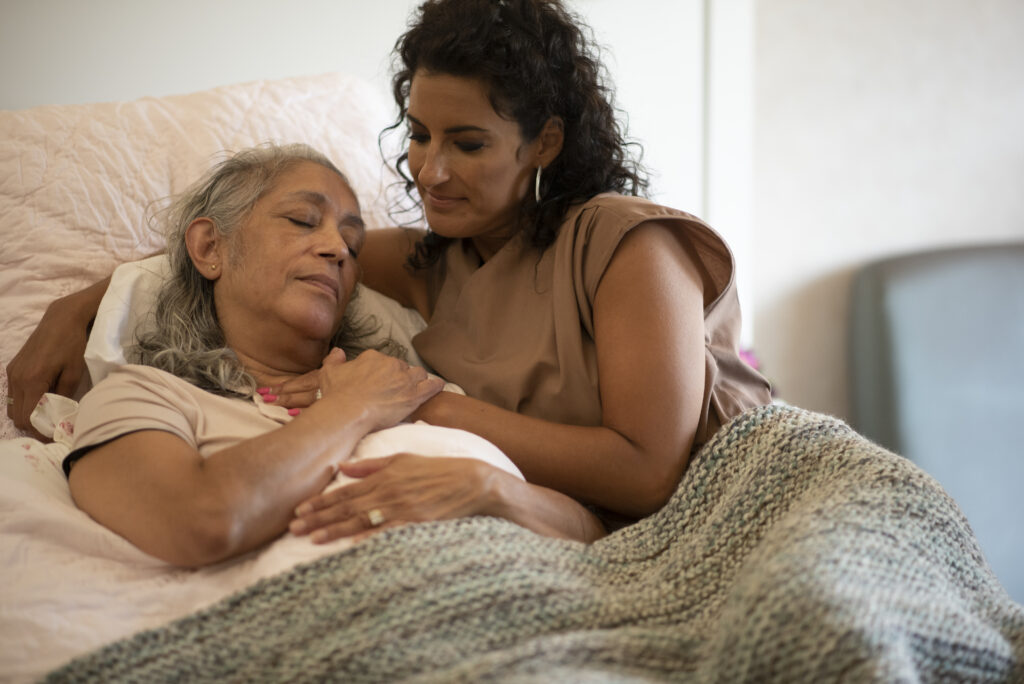By: Marie Marley, KCH Volunteer
Published: September 6, 2023
The phone rang at noon, waking me from a much-needed nap. It was one of the volunteer coordinators at Kansas City Hospice & Palliative Care, for which I provide companionship visits to those near the end of life.
“Can you take another lady?” she asked.
“Of course,” I said as I opened the blinds in my bedroom and turned on the light. “Tell me about her.”
“Her name is Maria [name changed to protect her privacy]. I just talked to her daughter, Catherine, who said her mother is extremely anxious. Plus, she hates the facility and the staff where she’s living. Worst of all, Catherine said her mother even yelled at her the last time she visited. She said that’s so unlike her mom.”
“Sounds like a difficult situation.” I said, walking into the kitchen and pouring a glass of orange juice.
“Yes, it is. Catherine also told me the doctors say Maria has only around a month to live.”
“I’ll go visit her tomorrow,” I said.
The following afternoon, I arrived at Maria’s nursing facility. I found her room at the end of the first-floor corridor. I stood in the doorway to the spacious private room and peered in.
“Maria?” I softly asked the white-haired lady sitting up in bed. She was just putting on her glasses.
When she heard my voice, she held her glasses in mid-air and looked over at me.
“Yes?”

Marie Marley, KCH Volunteer and award-winning author.
“Hi. I’m Marie Marley from Kansas City Hospice. May I come in?”
“Sure,” she said. “My daughter told me you’d be coming.”
I pulled up a chair near her bed, and we began chatting. She seemed sad, which made me a little sad, too.
“I need hearing aids,” she said at one point, her voice breaking. “But I’m not going to live long enough for it to be worth buying them.”
Tears appeared in her eyes.
“I’m so sorry to hear that, Maria,” I said.
I got a lump in my throat and had to blink several times to stop the tears. I handed her a tissue from the nightstand.
When she’d composed herself a bit she said, “They’re putting my house on the market tomorrow. My husband and I lived there for 30 years and raised our three daughters there.”
She burst into tears.
The visit wasn’t going very well. I wanted to cheer her up—not make her cry. But it seemed every topic that came up had just the latter effect on her.
She soon stopped crying, sighed, and looked down. “I don’t know why I’m telling you all this,” she said.
“That’s okay,” I said, leaning forward and taking her hand. “It’s what I’m here for—to listen to whatever you want to talk about.”
After more discussion—and a few more tears—I became determined to improve her mood.
Finally, on a whim, I asked, “Do you like music, Maria?”
“Oh, yes,” she answered, dabbing at her eyes.
“What kind of music do you like?” I asked.
I was hoping she’d answer that she liked classical music because I loved it almost more than life itself. Plus, I knew that the right classical music could cheer someone up right away.
“Classical!” she exclaimed, finally smiling.
I grinned and heaved a big sigh of relief. Perhaps I’d found the key to lightening her mood.
“Who’s your favorite composer?”
“Beethoven,” she answered without hesitation.
“What a coincidence. He’s my favorite composer, too! I can find some Beethoven on my phone if you’d like to listen to it now.”
“Thank you. That would be wonderful!”
I fiddled with my phone, found Beethoven’s first piano concerto and played the lyrical second movement. Maria sat up straighter in bed and closed her eyes. A lovely smile came across her face. She moved in time with the music. You could just see all of the anxiety draining from her body. She looked like a completely different person. It was incredibly rewarding to give Maria such pleasure, even if just for the hour I’d be there that day.
“Thanks,” she said, opening her eyes as the final chords faded. “That was so beautiful.”
Then, we listened to the last movement of Beethoven’s violin concerto. She smiled even more. After that I stood to leave.
“Thank you,” she whispered. “I loved it.”
“I’ll come back soon and play more Beethoven for you.”
“That would be wonderful. I’m looking forward to it.”
I typically visited my hospice patients once a week, but decided to see Maria three times weekly since she loved the music so much and since she had such precious little time left. And because through the music, we had already developed a special bond.
During that first week, we listened to the first, second, and fifth Beethoven piano concertos. Maria especially loved the fifth and most popular one, “The Emperor.” The following week we listened to the third symphony, “The Eroica.”
I began to notice that no matter how I felt when I arrived for a visit, I felt better on the way home. My visits to Maria were improving not only her mood, but mine as well.
Maria’s condition worsened steadily and after another week—filled with the sometimes-dissonant strains of Beethoven’s late string quartets—she became much weaker, but still wanted to listen to music.

I wanted to play tranquil music for her, so I Googled “relaxing classical music,” and found an album titled, “The Most Relaxing Classical Music in the Universe.” I played selections from it every time I visited.
A fleeting time later, I bowed out. Maria had fallen into a deep sleep, from which she’d never awaken. Her other two daughters had arrived from Nebraska, and I knew from experience that the family members would want to spend the time she had remaining alone with Maria.
Nonetheless, Catherine did call to consult with me in her mom’s waning hours. “What music should I play for her?” she asked, her voice strained.
“Google ‘The Most Relaxing Music in the Universe’ and play those selections,” I told her. “That’s what I played most recently.”
The dreaded phone call came from my volunteer coordinator from Kansas City Hospice on a Monday morning. “Maria passed away today,” she said.
I fought back tears. There would be no more Beethoven. No more wonderful smiles. No more concertos or symphonies.
Then the coordinator continued. “I just talked with Catherine. She said you changed her mother’s life. That her mom was completely transformed by the music you played. She said that her mother’s anxiety had decreased dramatically, and she no longer complained about the facility and staff. Most importantly, she said that she and her mom had returned to their previous loving relationship.”
I was deeply touched. It was so kind of Catherine to make that call, especially since her mother had just died. I felt gratified to know I’d made a difference in Maria’s life. Thinking about it later that evening, I realized that Maria had been a blessing to me, and that I’d received far more than I had given.
As a volunteer at Kansas City Hospice & Palliative Care, you can also make a difference in the lives of people who are facing serious illnesses. There are many ways to get involved, including becoming a community volunteer, Story Boutique volunteer, or an ongoing volunteer, where, like me, you can visit patients in their homes, care facilities, or at the two KCH hospice houses.
Take a moment to learn more about volunteer opportunities and how your talents and interests can make a difference in someone’s life.
Marie Marley is a Kansas City Hospice volunteer and author of the award-winning book, “Come Back Early Today: A Memoir of Love, Alzheimer’s and Joy.” ComeBackEarlyToday.com
Posted in General, Volunteer Impact

This story made me cry with happy tears. I have been a volunteer for a while and it is so rewarding to make a difference in someone’s life during that time. Thanks for sharing!
What an amazing and touching story! Music is such a powerful tool and how awesome that you both had the same musical taste. You were meant to be there to leave a lasting impression for her and comfort her in her final days. Thank you so much for sharing!